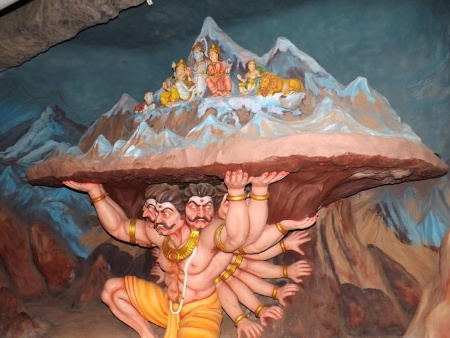
Who does not benefit even after finding the best Guru?
In Shri Rama Charita Manasa, Lord Rama says to his devotee Shabari in the context of nine forms of devotion:
Jwa nX n§H$O godm Vrg[a ^J{V A_mZ &
“Shabari, humble service at the lotus feet of one’s Guru is the third form of my devotion.”
Shabariji’s life was spent rendering service to her Guru, therefore, by making her an instrument, this preaching is given for the welfare of all of us. The more we understand the secret behind it, the more spirituality we will experience in our life.
The service of Guru while being amÍna is devotion. The meaning of amâna is to be egoless. Service of Guru without being free from the sense of egoism is only an ego-trip, and not devotion, hence the results of that service can’t be good.
Ravana in Shri Rama Charita Manasa is an example of such devotion.
Ravana was a disciple of Lord Shankara (Lord Shiva). He composed Shiva Tandava Stotram in glorification and offered his heads in worship to Lord Shankara. Ravana himself reminds of this incident often because it was not devotion to his Guru, but only an effort to prove himself the greatest disciple of Lord Shiva.
Bhushundi ji also had a Guru. The sentiments expressed by Bhushundi ji before Garuda ji about Guru are touching.
Garuda ji asked Bhushundi ji: ‘Since you have attained Perfection in your life, won’t you be feeling any grief now?’
He said that despite having attained the highest state of Knowledge, whenever I remember the nature of Guru ji then...
EH$ gyb _mo{h {~ga Z H$mD$ &
Jwa H$a H$mo_b grb gw^mD$ &&
(Shri Ramacharita. U.K.: 109.1)
“Yet one thing ever stung my conscience: my Guru’s mild and amiable disposition I could never forget.”
I become distressed by grief. Gurudev was so tender-hearted, virtuous (holding good character) and generous that he continued to think only about my welfare despite being disrespected by me. Even Lord Shankara became angry because of my arrogance and cursed me. But Gurudev is so great that he pleased Lord Shankara for me and changed the curse into a blessing. If my Gurudev had not been so kind to me, my life would not have been as it appears today.
When someone asked Ravana, “Why did you lift up Mount Kailasa?”
What Ravana said was full of egoism. Ravana said: “I weighed the whole world with the strength of my arms. The strength of my arms was weightier and thus I won it all. After the conquest of the world, I also went to Mount Kailasa. Now if I would have said to Lord Shankar ji, “I have defeated the whole world, now let’s fight, it wouldn’t seem good. So, I thought why shouldn’t he be lifted up along with Mount Kailasa, so that it would be proven who was heavy and who was light.”
In fact, Ravana did not lift Lord Shankara with reverence; he was only measuring the might of his arms.
_Zhþ± Vm¡{b {ZO ~mhþ~b Mbm ~hþV gwI nmB &&
“In a sportive mood he went and lifted Mount Kailasa, thereby testing it as were the might of his arms, and returned most jubilant.”
And he wanted to show that in comparison to him, Gurudev also proved lighter.
‘Guru’ means heavy. It means the disciple should consider him small and consider Guru to be the best. But Ravana wanted to prove himself the best and Guru as small. It is not possible for such a person to get supreme welfare through Guru.
The indication behind serving the Guru while being amÍn is that the disciple should humbly say to the Guru: “Maharaj! I am a pot which is completely empty. Please shower your grace and fill it with your spiritual instructions and give me completeness.”
While serving the Guru, if the disciple feels that he is getting blessed by serving his Guru, then he is moving in the right direction, but if he keeps the mental attitude that he is making his Guru well-known, then it is unfortunate for him.
Due only to this sense of egoism, Ravana, despite being an ascetic engaged in penance, an expert in the practice of Yoga and a powerful person, who also had the world’s best Guru, Lord Shankara, could not become eligible for his supreme welfare (emancipation). All the worship done by Ravana went in vain.
Ravana told Lord Shankara, “I am the Master of the entire universe, I want to worship you, but what should I do? I don’t have time. Therefore, you come to me to get worshipped by me.”
Lord Shankara, with kindness, accepted his request. Ravana would think when seeing him that he was afraid of me and that is why he comes to me. Now is this fortune or misfortune of Ravana? If Guru has to come down from his lofty state to the lower level of his disciple out of compassion to emancipate him and the disciple feels proud of it, nothing is more unfortunate than this for the disciple.
Even after getting the best Guru, some people do not get much benefit. The only reason is their ego. Due only to being full of egoism, they cannot become eligible to digest Guru’s grace and assimilate spiritual instructions from Guru in their life.